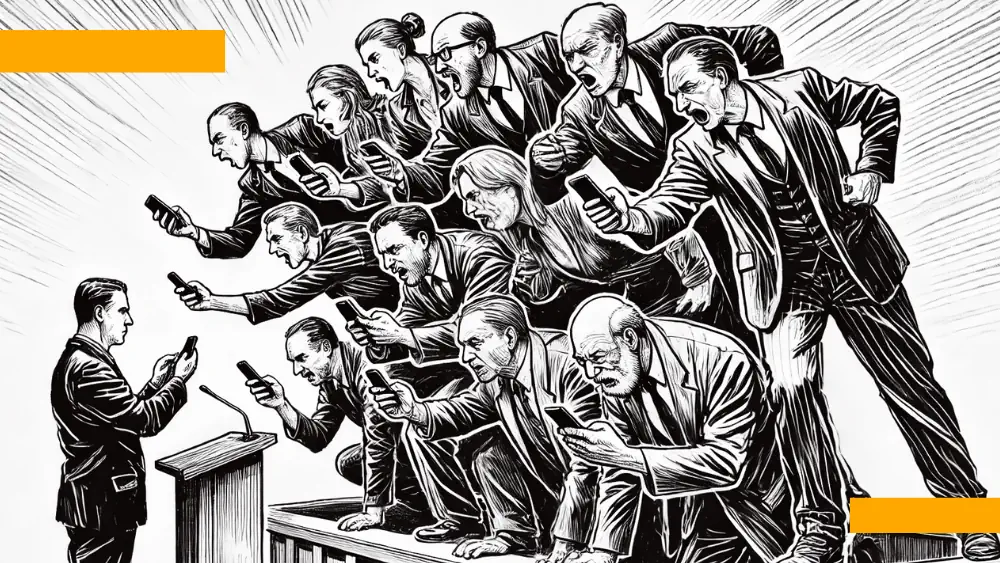 illustration: DALL-E
illustration: DALL-EDisinformation, regardless of whether it takes the form of conspiracy theories, fake news or unverified information, has become an integral part of the contemporary media landscape. Understanding the dynamics of this phenomenon is crucial to understanding the mechanisms of shaping public opinion and the ways in which information spreads in the digital age.
Study conducted in the UK shows that nearly 44 percent of people shared posts on social media with the intention of influencing the decisions of others. This indicates the significant role of motivation related to the need for power in shaping online behaviour.
Similar trends can also be observed in the non-virtual world - dominant people are usually more active in communication: they speak longer and more often. In situations where they lack real power to influence and control, people use information to influence others and maintain or take a leading position in their social networks.
The Need for Power Motivates
– In our research, we decided to check how people driven by power motives use social media to increase their influence, with particular emphasis on the frequency of sharing disinformation – explains Professor Małgorzata Kossowska, leader of the DigiPatch project, who runs the Behaviour in Crisis Lab at the Institute of Psychology, Faculty of Philosophy of the Jagiellonian University.
A total of over 1.8 thousand people took part in the four studies. The researchers examined the participants` declarations regarding sharing posts on social media, and used an information sharing simulation task to verify their actual behaviours.
– We assumed that people who seek to influence others, exercise control, and achieve higher positions in power structures are actively involved in social media and are proportionally more likely to spread information, including disinformation, than those less motivated by power – Kossowska describes.
The results of the study, conducted in collaboration with researchers from University College London and the University of Kent, were published in Computers in Human Behavior.
– Our results showed that social media users driven by the need for power overshared other people`s posts and news headlines, including disinformation. This tendency applied to both declared everyday behaviours on social media and the results of the simulation task – explains Professor Małgorzata Kossowska.
The respondents who were motivated by power disseminated disinformation to a disproportionate extent (in relation to all posts). They did so despite being aware of having disseminated disinformation in the past.
Disinformation Harms Reputation
– The results suggest that people motivated by the need for power are not driven by the pursuit of accuracy of the information they share, and that true and false posts have similar priorities in their sharing choices. In this way, they ensure their influence over other network users – the researcher comments.
Interestingly, power itself - real or perceived - was not associated with the spread of disinformation, i.e. with the proportion of posts shared containing false information.
– Motivations related to the need to gain prestige and a sense of importance were also not associated with increased spreading of disinformation. Sharing disinformation can potentially damage reputation if such a practice is revealed. Therefore, spreading disinformation would not meet the needs of these people – Kossowska explains
The researcher points out that the relationship between the motivation to gain power and the spread of disinformation may be stronger when false content is consistent with the views or political goals of the people sharing it.
– This is an important issue, especially in the context of debates suggesting that the excess of disinformation is fuelled by some elites in power and political activists striving to gain power – emphasises Professor Małgorzata Kossowska.
source: PAP SceinceinPoland.pl
COMMERCIAL BREAK
New articles in section Law in media
Dietary supplement ads in Poland. Who keeps influencers in check?
Newseria, KFi
One in three Polish internet users considers influencer recommendations when deciding on medicines and dietary supplements. Although promotion of such products is regulated, there are still cases of advertising that skirt the law.
SEO Poisoning. Hackers Use Search Engines to Target Businesses
Piotr Rozmiarek
Search engines help us quickly find information, but they can also be used by cybercriminals. SEO poisoning is a tactic where attackers manipulate search engine rankings to place harmful websites at the top of search results.
Phishing in the Cryptocurrency Industry. Fake Recruitments Steal Data
Piotr Rozmiarek
Security researchers have detected a social engineering campaign targeting job seekers in the Web3 industry. The attack aims to conduct fake job interviews via a meeting application that installs information-stealing malware.
See articles on a similar topic:
Online Hate in Numbers. What Do We Think About Offensive Comments?
KFi
Nearly 70% of adults have encountered online hate. The group most affected includes individuals aged 18-24, with 81% reporting exposure to hateful content - according to the report "Hate on the Internet," prepared by the polish Foundation "W zgodzie ze sobą" in cooperation with Maison&Partners and the Ariadna research panel.
Local Media in Poland - Announcements
Bartłomiej Dwornik
Research by ComPress Agency, conducted among journalists in 2001, indicates that only 7 percent of them believe that PR specialists and press spokespeople understand journalists' needs well.
Local Media in Poland - Court Cases
Bartłomiej Dwornik
Investigative journalists in local newsrooms often remain in the shadow of their colleagues from national outlets, despite frequently being the first to uncover a scandal.
Cyber Attack on a Corporate Smartphone. How to Protect Yourself
KrzysztoF
Internet-connected mobile devices are an attractive target for cybercriminals. The key to protecting sensitive business data is employee awareness, hardware solutions, and appropriate software. This mini-guide provides a quick overview of how to protect each of these areas.





























